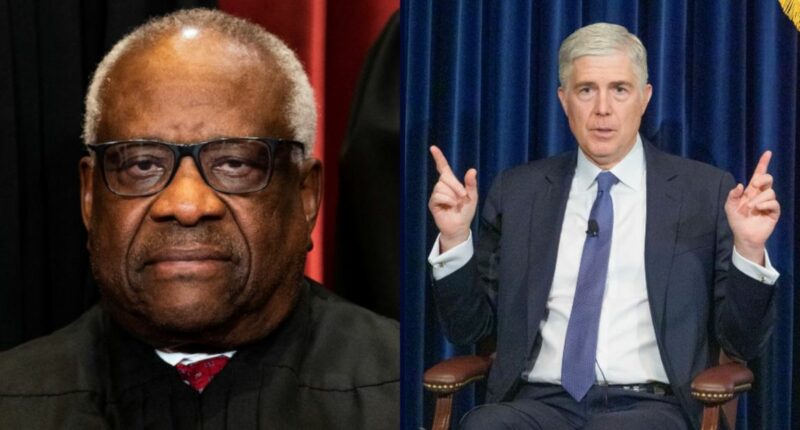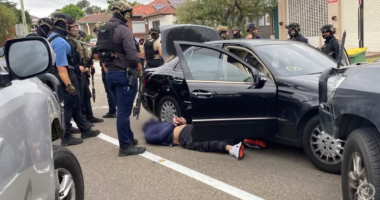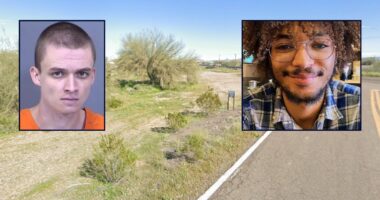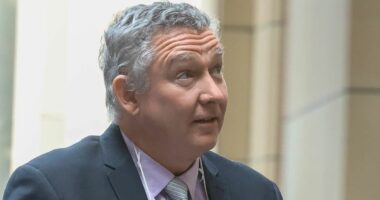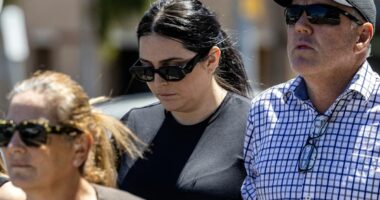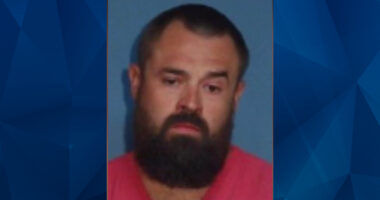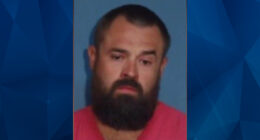Share this @internewscast.com
Left: Associate Justice Clarence Thomas sits during a group photo of the Justices at the Supreme Court in Washington, D.C, on April 23, 2021 (Photo by Erin Schaff/Pool/Getty Images). Right: U.S. Supreme Court Associate Justice Neil Gorsuch speaks at the Ronald Reagan Presidential Library Foundation in Simi Valley, Calif., on Thursday, Aug. 8, 2024 (AP Photo/Damian Dovarganes).
Justices Neil Gorsuch and Clarence Thomas expressed their dissatisfaction with their peers at the beginning of the week for not utilizing their authority to address the federal government’s “plenary power” over the internal affairs of Native American Tribes. They compared the current situation to some of the most notorious rulings in the history of the Supreme Court.
Their critique was articulated in Gorsuch’s remarks, which Thomas endorsed, appearing at the conclusion of an orders list from the high court. This list included the decision not to review the petition for a writ of certiorari submitted by Quentin Veneno, Jr., against the United States.
Veneno’s petition requested the justices to overturn the 1886 ruling in United States v. Kagama, arguing that Congress “lacks the constitutional authority to criminalize conduct between members of the same tribe occurring on tribal land, or at least to clarify the constitutional basis upon which Congress can criminalize such conduct.”
The Kagama case affirmed the legality of the Major Crimes Act of 1885, which granted federal courts jurisdiction over serious offenses, such as murder, manslaughter, and rape, committed by Native Americans against fellow tribe members on tribal land.
The court’s justification for this decision portrayed Native American tribes as “wards of the nation” who rely heavily on the United States for necessities and political rights, without owing allegiance to the States or receiving protection from them.
“Due to local animosities, the States where they reside often become their fiercest adversaries. Their vulnerability and helplessness, largely a result of how the federal government has dealt with them, and the treaties that promised protection, have created an obligation to safeguard them, accompanied by power,” the 1886 decision stated, much to Gorsuch’s discontent. “This has consistently been acknowledged by the executive, Congress, and this Court whenever the issue has arisen.”
Gorsuch, an unsurprising advocate on the issue, said the Kagama decision and the “plenary power” over tribal affairs that the government has asserted ever since are based on a theory rooted in “archaic prejudices” that “should make this Court blush” — like the notion that tribes are too “weak” to dole out justice for major crimes themselves.
“This Court is responsible for Kagama, and this Court holds the power to correct it. We should not shirk from the task,” Gorsuch scolded, noting that the tribal courts have not been “completely displaced” but saw their “traditional sovereign tribal powers” curtailed through Kagama on the strength of “archaic colonial prejudices nowhere found in our republican Constitution and wholly antithetical to it.”
Gorsuch ripped the silent majority for declining to “confront decisions, like Kagama,” which “cannot be explained by the Constitution, but only by the atmosphere of their times.”
“I regret that the Court declines to take up that challenge today. But whether the day of reckoning for the plenary power theory comes sooner or later, it must come. Nor is that day to be feared,” the justice went on. “If this Court were to overturn Kagama, Tribes could exercise their sovereign powers to address ‘major’ crimes among Indians, something this Court has no business assuming they are too ‘inferior’ or ‘weak’ to do without supervision from a ‘superior’ people.”
In a parting shot, Gorsuch likened the Kagama decision to Plessy v. Ferguson, which once upheld the constitutionality of racial segregation before it was overturned, and Korematsu v. United States, which justified internment camps for Japanese Americans during World War II.
“Doubtless, as the government stresses in its opposition to this petition, many of this Court’s plenary power decisions have stood for years. But the same was once said in defense of Plessy v. Ferguson and Korematsu v. United States,” Gorsuch concluded. “And, as with those cases, our plenary power decisions demand reconsideration if this Court is ever to bring coherence to the law and make good on its promise of fidelity to the Constitution.”
